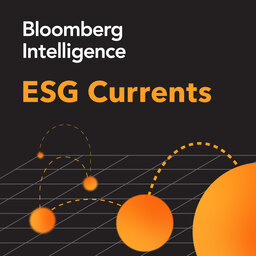Kolbert Sees Great Work, Scant Progress on Climate
In her new book “H Is for Hope: Climate Change from A to Z,” Elizabeth Kolbert writes that “to say amazing work is being done to combat climate change and to say that almost no progress has been made is not a contradiction. It’s a simple statement of fact.” In this episode of ESG Currents, the Pulitzer Prize-winning journalist and author joins Bloomberg Intelligence Director of ESG Research Eric Kane to talk about this paradox, why she was drawn to writing about climate change and biodiversity, the timeline of earth’s history, whether we can reach net zero when we keep inventing new ways to consume energy and much more.
This episode was recorded on April 22.
In 1 playlist(s)
ESG Currents
ESG has become established as a key business theme as companies and investors seek to navigate the c…Social links
Follow podcast
Recent clips

Explaining the Ins and Outs of Blended Finance
35:43

Clean Power’s AI-Driven Demand Opportunity
41:36

Trillium on the Value of Shareholder Engagement
30:28
 ESG Currents
ESG Currents